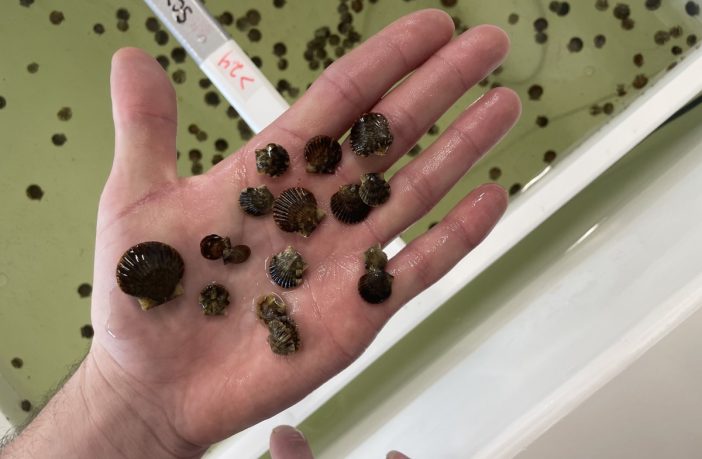Scientists try to save Peconic Bay scallops by changing their spawning season

With funding from a Long Island-based foundation, the Cornell Cooperative Extension (CCE) of the Suffolk Marine Program is working to ensure the long-term survival of Peconic Bay scallops by experimenting with shifting hatchery spawning from summer to fall.
The Robins Island Foundation is supporting a first-of-its-kind CCE initiative that hopes to improve the survival of bay scallops after four consecutive years of mass mortality. The CCE Bay Scallop Restoration Program has also received ongoing support from Suffolk County through the County’s Water Protection and Restoration Program since 2005.
“The CCE Marine Program is focused on the success of commercial fisheries here on Long Island and much of our work is focused on Peconic Bay scallops,” said Chris Pickerell, Director of the CCE Marine Program. “Recent extinctions have made our job more difficult. This new initiative aims to ensure that we can continue to support the fisheries and the local economy.”
CCE researchers point to two factors contributing to the mass extinction. The first is an increase in water temperature, which is generally believed to be a consequence of climate change. Another variable is the occurrence of the parasite, first reported in Peconic Bay populations in 2019. According to published reports, the annual scallop harvest in the regional industry in 2020 and 2021 was several times less than in 2017 and 2018.
“The economic and cultural value of the Peconic Bay scallop to life in the East End cannot be overstated,” said Suffolk County Assemblyman Al Krupsky. “I am proud of the role that Suffolk County has played for over 15 years in supporting CCE’s efforts to support this vital industry and I am delighted that the Robins Island Foundation has chosen to support this important work as well.”
“We are pleased to support the critical work of CCE scientists on this important initiative,” said Ann Collie, Executive Director of the Robins Island Foundation. “The scallop fishery is an integral part of both the history and economy of the East End and we hope that this new approach to spawning will be successful and that Peconic Bay scallops will thrive for generations to come.”
Laurel scallops usually spawn once during the summer in their second year. In recent years, the CCE team, working with Suffolk County, has been able to obtain large numbers of summer-grown sea scallops. The current CCE research focuses on the less common and uncommon fall spawning.
In October and November 2022, the CCE production hatchery in Southold had two successful spawns, resulting in about 30,000 young scallops in the hatchery. This spring, a team of conservationists will conduct a series of field experiments to evaluate the hardiness of these fall scallops. The team will aim to investigate the survival, breeding and infection rates of autumn scallops and compare the results with those of summer-spawning scallops. If autumn scallops survive better than summer scallops, such finds could be very useful in future restoration efforts.
“We were thrilled to be able to get our first fall scallop caviar here at the hatchery in Southold,” said Josh Perry, CCE Production Hatchery Manager. “Spawning and rearing out of the regular season was both challenging and exciting. It is based on the dedicated work that my colleagues have been doing over the years.”
“We are growing scallops that spawn in the fall, but now we need to see if these scallops survive better than the ones we raised in the summer,” said Harrison Tobey, CCE scallop farming program specialist. “I’m looking forward to taking the plunge and working with my team in the coming months to see if what we’re trying to do will significantly improve scallop survival. I am confident that we will soon be better equipped to restore the fishery to the state it was in before the recent extinction.”
To learn more about the CCE scallop recovery program, visit www.ccesuffolk.org/marine/aquaculture/scallop-program, www.ccesuffolk.org/marineand follow @ccemarineprogram on social media.
Inquiries regarding the CCE Marine Program scallop fishing initiative can be directed to Harrison Tobey at: [email protected] or 802-310-3761.
Dallas Press News – Latest News:
Dallas Local News || Fort Worth Local News | Texas State News || Crime and Safety News || National news || Business News || Health News
texasstandard.news contributed to this report.










